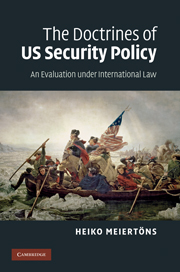Preface and Acknowledgements
Published online by Cambridge University Press: 06 July 2010
Summary
The year 2009 will be remembered as the end of eight years of the Bush Administration, with Barack Obama being sworn in as President that January. A legacy of the previous administration, in terms of international law, is the Bush Doctrine of 2002, formulated in reaction to the events of 11 September 2001. It is one of the most striking examples of the generally low opinion in which international law was held by some within the US administration at that time. As one legal adviser from the Pentagon stated in a conversation in 2008, recalling the years 2002 to 2003: ‘I wasn't asked a legal question in two years.’
Announced at the height of this generally hostile approach, it seems natural to discuss this doctrine with regard to its impact on the ius ad bellum. It also has to be analysed in a broader legal and historical context. The practice of outlining principles for the conduct of US foreign and security policy in so-called doctrines is a characteristic feature of US foreign policy. From an international lawyer's perspective, two questions arise from these doctrines. First, to what degree are the criteria for the use of force laid down in these doctrines consistent with the limitations of the use of force in international law? Second, which law-creating effects do these doctrines have? Furthermore, to date the legal nature of these doctrines remains largely unexplored.
Information
- Type
- Chapter
- Information
- The Doctrines of US Security PolicyAn Evaluation under International Law, pp. vii - xiiPublisher: Cambridge University PressPrint publication year: 2010
